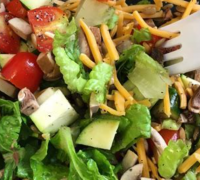Happy New Year, friends! ✨
As the fireworks fade and the champagne flutes dry, many of us find ourselves contemplating the blank slate of a new year. We whisper aspirations about healthier habits, bolder careers, and deeper connections. But…change can be hard. We’ve fallen victim to resolutions before, derailed by the inertia of old habits and the siren song of comfort.
THIS year, let’s rewrite the narrative. Forget the lofty, all-or-nothing ambitions. Instead, let’s embrace micro-transformations, focusing on consistency over complexity. The secret weapon? A keystone habit. (see Forbes article on keystone habits for more)
Research tells us that building one keystone habit, a fundamental behavior that ripples into other areas of life, is far more effective than juggling an unwieldy list of resolutions. Think of it as planting a single acorn, nurtured each day, destined to become a mighty oak, its branches reaching towards a healthier, happier you.
So, how do we cultivate this keystone habit? Start small. Pick something achievable, something that ignites a spark of joy. Maybe it’s a 10-minute morning meditation, a brisk walk beneath the sunrise, or whipping up a nutritious breakfast instead of grabbing a sugar-laden pastry. These seemingly insignificant acts, repeated daily, become the threads woven into the tapestry of lasting change.
Simplicity is key. Don’t overcomplicate the process. Your keystone habit should be a seamless integration into your routine, not a battle of willpower. Find what resonates with you, what aligns with your natural rhythms and preferences.
Harness the power of the morning. Early hours hold a quiet magic. Our minds are fresh, our resolve unwavering. That’s why I champion the power of sunrise movement. A simple yoga flow, a jog bathed in golden light, walking barefoot in the grass, a dance session infused with your favorite music – these energize your body and spirit, setting the tone for a focused, productive day.
Consistency is the cornerstone. Every missed practice isn’t a failure, but a gentle reminder to recommit. Remember, progress, not perfection, is the true measure of success. Be kind to yourself, celebrate small wins, and trust in the momentum of daily repetition. (See “8 Steps to Create Consistency in Workouts” post)
This year, let’s ditch the pressure and embrace the process. Let’s focus on nurturing one powerful habit, a keystone that unlocks a cascade of positive transformations. What will your keystone be? The acorn you plant today might just become the oak that shades your tomorrow.
Wishing you a year brimming with health, happiness, and the quiet power of consistent, mindful change.
Happy New Year!
Lisa









